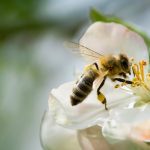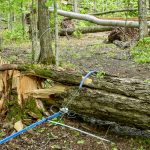Tag Archives bees

Ontario Beekeepers to receive $1.3 million
Investment comes after rough patch for Ontario beekeepers

U of G hits sweet spot with honeybee research centre
New centre to operate as hive of community engagement

U of G constructing new Honey Bee Research Centre

Beekeepers call to reopen cross-border package bee trade
Ten years after the last risk assessment, some say it’s time to re-evaluate

Fertilizers change how bumblebees ‘see’ flowers
Science Notes: Findings suggest the number of bees that visit a flower may be reduced

Microbe protects honeybees by boosting nutrition
Science Notes: Specific microbe thrives in royal jelly

Derecho dealt a heavy blow to beekeepers, maple syrup producers
Extreme weather and climate change could impact insurance in the future

Ontario beekeepers reeling from triple-season hit
Poor weather and varroa mite extract heavy toll on colonies

A better way to track bee health
Tracking colonies used for pollination services allows beekeepers to prevent losses and make better management decisions



